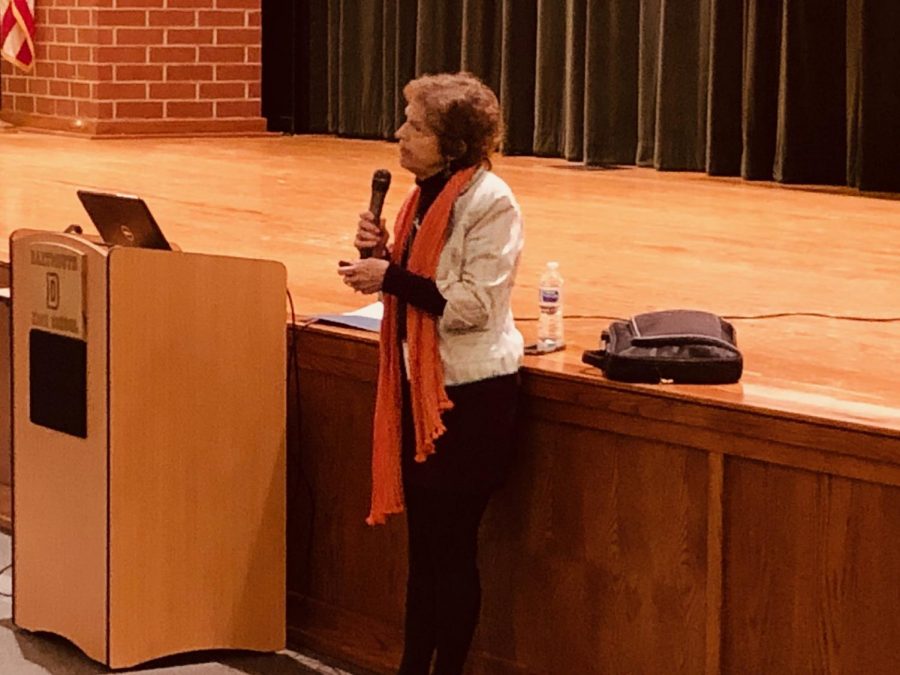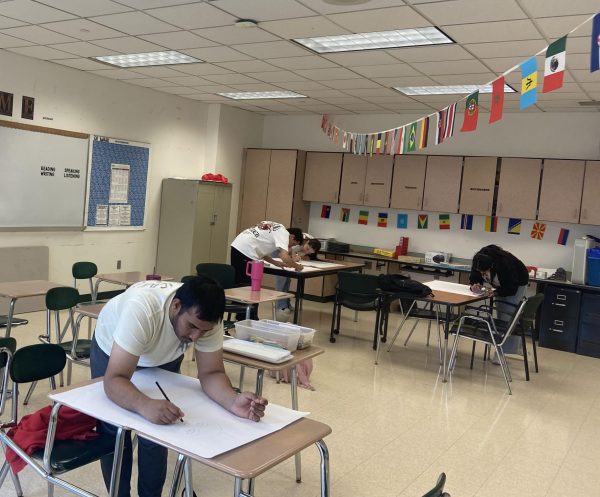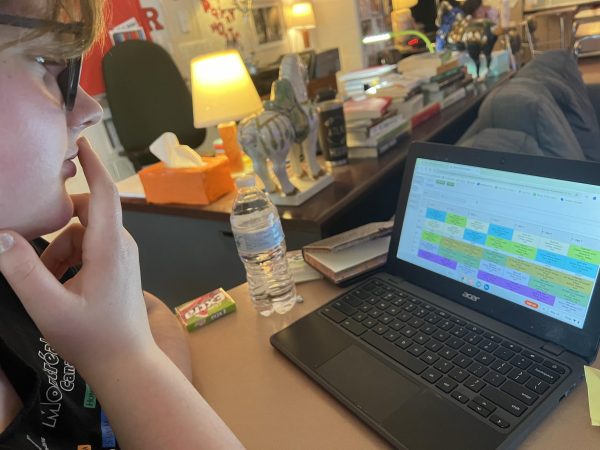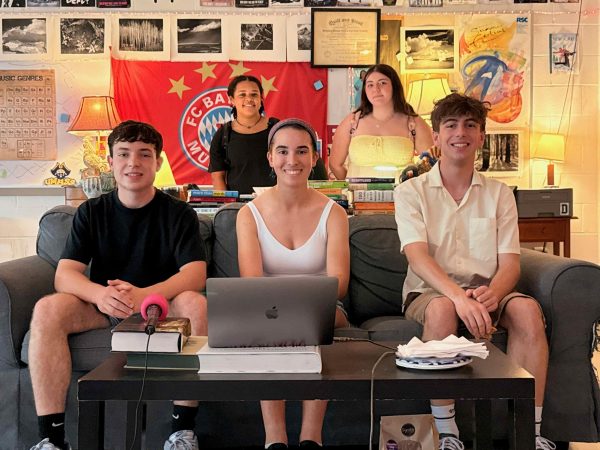Local Author Holly Fitzgerald Speaks to DHS Students
Dartmouth resident and author Holly Fitzgerald speaks to DHS students on Monday, November 5.
Students in second and third period English classes file into their seats in the slightly chilly, dimly lit auditorium. A small, older woman stands timidly beneath a projection screen. Her peach colored scarf is the brightest thing she’s wearing. Her neatly pressed gray blazer frames her tiny shoulders, and her plum dress comes down to her knees. The earrings dangling from her ears are bright blue, just like her eyes. They catch the students’ attention right away. Everyone in the room knows that they’re in for something special. Holly Fitzgerald, an author and Dartmouth local, spoke to students during an assembly on November 6th.
Fitzgerald begins her presentation, and tells a story about perseverance, determination, and survival. She clicked to the next slide of the PowerPoint presentation, each slide studded with astounding photographs taken by Fitzgerald herself. “I’m gonna take you on a journey,” she told students during her second presentation of the day.
Fitzgerald’s memoir, Ruthless River, recounts the remarkable true story of when she and her husband, Fitz, were trapped in the jungle on the Madre de Dios River for 26 days in 1973. At first, the couple found themselves on a globetrotting honeymoon, which ended up being a memorable sojourn in South America.
Fitzgerald listed off several things she and her husband were able to do before being trapped in the jungle. They rode horses, went canoeing with the natives, celebrated Christmas, went skiing, ate bugs – and those are just to name a few.
Fitzgerald recalls her stay in South America as serendipitous. “You know how life is,” she said, of taking detour after detour during her trip, “you just never know.”
Fitzgerald and her husband found themselves stuck in the rainforest after a small passenger plane crash-landed in Peru while on the way to the Amazon basin. Thankfully, the crash yielded no deaths, but the young newlyweds needed a way out of the forest, and back to their initial travel itinerary. The two settled on taking a log raft up the Madre de Dios towards the basin. Reflecting back upon the crash, Fitzgerald remembers thinking to herself, “No one’s gonna believe this back home.”
In the midst of all the action, she told her husband to stand in front of the wreckage for a photo.
The cover of the book holds substantial meaning. The dark, ominous forest is foreboding, and filled with danger at every corner. A snake lurks in the murky water. The paper containing the title is reflective of the journal paper Fitzgerald used to keep track of how she spent her time stranded in the forest. She recounts the constant danger she felt while trapped in the rainforest. She said, “We were so scared all the time that we were going to die.”
The Madre de Dios is dangerous, according to Fitzgerald. The piranhas and snakes pose as immediate threats, but food and clean water is also hard to come by. During the day, the sun beats into the canopy and the temperatures rise. At night, the mosquitoes buzz outside of the tent, searching for a way in. The cruel forest provides a hostile environment away from civilization. Fitzgerald said, “It didn’t look like I expected from the National Geographic!”
After all these years, the aspect of the trip Fitzgerald still looks upon the fondly is the people. The detours taken at every stop led to newer, more niche experiences. Spending time with indigenous tribes “slows life down,” according to Fitzgerald. Getting to know people native to South America made her trip more special, and different than any other organized tour.
FItzgerald hopes that students take something away from her work. She hopes that the prominent themes of survival and determination stick with readers as they learn about her struggle to survive in the rainforest. “In terms of survival, I hope there are some helpful insights,” she said, wrapping up her presentation. “Survival doesn’t have to be dramatic,” she explains, advising students that survival skills can be applied to most situations in everyday life.
Decades after Fitzgerald and her husband escaped from being trapped in the jungle, she was finally able to write about it. Above all, she credits her daughter for asking the question, “Why don’t you write this book?” In May of 2017, Ruthless River was published. Recently, the rights to her critically acclaimed novel were signed off for a movie deal.
In Dartmouth, Holly Fitzgerald is still very much a part of the community. She donated a class set of Ruthless River to Dartmouth High, the same high school her own children attended. Her critically acclaimed novel is a testament to her strength and survival, and her success makes Dartmouth proud.










